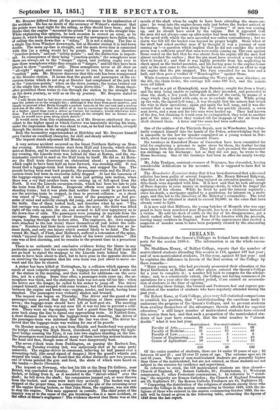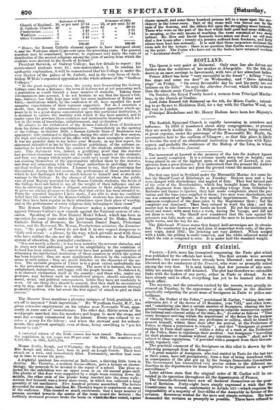IRELAND.
The Presidents of the Queen's Colleges in Ireland have made their re- ports for the session 1850-1. The information is on the whole encou- raging.
Dr. Shuldham Henry, of Belfast College, reports that the number of matriculated students attending this session is 110, against 107 last year; and of non-matriculated students, 74 this year, against 85 last year : and he explains the difference in favour of the first session of the College by these remarks— "Many young men, who had previously prosecuted their education at the Royal Institution at Belfast and other places, entered the Queen's College for a year to complete it ; a number fell back to compete for the scholar- ships; and, to a considerable extent, the College not having commenced its operations for a year after the expected ,period, tf.ere existed an accumula- tion of students at the time of opening.' Considering these things, the Council and Professors feel and express gra- tification at the number of students who have regularly attended during the past year.
Sir Robert Kane, at Cork College, gives very full statistical comparisons to establish his position, that "notwithstanding the exertions made to embarrass the progress of the Queen's Colleges, and to prevent students from availing themselves of the advantages therein afforded for superior education," a still larger number of matriculated students have entered this session than last, and that such a proportion of the matriculated stu- dents of last year have remained, that the total number is "almost
Non-matriculated.
Total.
12 68 19 60 3 6 1 19 3 13 38 156 double" what it was last year.
Matriculated,
Faculty of Arts 56 Faculty of Medicine 31 Faculty of Law 3 Course of Engineering.... 18 Course of Agriculture .... 10 118 Of the entire number of students, there are 14 under 16 years of age ; 82 between 16 and 21; and 26 over 21 years of age. The extreme ages are 14 and 36 years. The ages of non-matriculated students are generally higher than those of the matriculated, but are not entered, as those students are not subject to the statutes for residence and supervision. In reference to creed, the 118 matriculated students are thus classed— Church of England, 42; Roman Catholic, 65; Presbyterian, 2; Wesleyan communion, 8; other Protestant communions 1. In reference to "stand- ing," the majority are Roman Catholics ,• the 'Church of England Freshmen are 23, Sophisters 19; the Roman Catholic Freshmen are 42, Sophisters 23. "Comparing the distribution of the religions of students among those who entered the College in the session commencing in October 1849, with the re- ligions of those who entered in the session commencing October 1860, the re- sult will be found as given in the following table, extracting the figures of 1849 from the last report. lintranea of18-19. Entrance ot1860. Church of England 26, or per cent 37:14 23, or per omit 32•40
E. Catholic Church 38 „ 64-29 .... 42 „ Meld
- Presbyterian 1 ,,:1.43 1 ,, 131 Wesleyan „ Other Communions .1 „ 1•43 ..,.. 0 „ 70 100.00 71 100.00 " Hence, the Boman Catholic element appears to hate increased about 40and the Wesleyan about 1 percent upon the preceding years. The general numbere may be considered, however, to represent very fairly the ratio of distribution of the eeveral religions among the class of society from which the students were deriveclin the South of Ireland." President Berwick, of Cralway College, has few details to report : ids matriculated students were 24; -nonenatriculated, 2. In reading his apologetic explanation, it will be remembered that his College is under the very shadow of the palace of St. Jarlath, and in the very focus of Arch- bishop M'Hale's organized opposition to the whole scheme of the "Godless Colleges."
" La the great majority of cases, the young men frequenting-the. Galway College come from a distairoe ; the town of Galway not as yet possessing-such a population as would furnish a large number of students. Taking these circumstances into account, I do not hesitate to say that the Queen's Col- lege, Galway, has fully kept pace with her sister institutions of Belfast and Cerk,—institutions which, by the confession of all, have equalled the most sanguine expectations of their warmest supporters. Nor do I entertain a doubt, that, despite the extraordinary and continued opposition which ap- pears to be in a great degree concentrated upon this particular institution, it is destined to outlive the hostility with which it has been assailed, and to eonfer upon the province those countless and inestimable blessings which fol- low in the train of knowledge, enlightenment, and civilisation." Ile alludes to the withdrawal of the Roman Catholic Dean of Residences from his duties of religious superintendence. "Immediately on the opening of the College, in October 1849, a Roman Catholic Dean of Residences was appointed; who continued to discharge, during the entire of the first session, the high and salutary duties of his office with the most exemplary attention. It was my grateful duty to lay before your Majesty, in my first report, the statement submitted to me by this excellent gentleman, of the extreme sa- tisfaction.he had derived from the conduct of the students submitted to his care. This statement was, indeed, a gratifying proof that the statutes had provided abundant securities for the faith and morals of the students, and that any danger which might arise could only result from the churches not availing themselves of the opportunities afforded them by the statutes, and from not cooperating with the College authorities in providing for the spiritual welfare of the students. I lament to say, that this gentleman has intermitted, during the last session, the performance of those sacred duties which he had discharged with so much honour to himself and so much ad- vantage to the College. In the absence of that minister whom the public care of your Majesty provided for the Roman Catholic students, the heads of the College have not failed to use all the weight of their influence and ad- vice in enforcing upon them a diligent attention to their religious duties. It gives me sincere pleasure to declare that that advice has been attended to. From the repeated inquiries I have made, I am able to state my confident belief that the conduct of the Roman Catholic students has been excellent; that they have been regular in their attendance upon their place of worship, and in the performance of every religious duty belonging to their creed."
The Roman Catholic Newry Examiner makes a praiseworthy stand against Primate Cullen's new crusade against the National system of Wu.- adieu. Speaking of the New District Model School, which has been in operation for some years under the joint inspection of Dr. Blake, Roman Catholic Bishop of Dromore, the Reverend Daniel Blegot, Protestant rector, and the Reverend Mr. Moran, Presbyterian minister, the Examiner says, "the people of Newry do not find it in any respect dangerous to faith and morals' : a phrase, by the way, which prevails most with those who•have neither the one nor the other." In reference to the National system of educatioe, the journalist continues— "it is not merely a theory ; it has been tested by the severest obstacles, and in every new trial additional proof of its adaptability to the condition of Ireland has been adduced. We ourselves have had painful opportunities of witnessing the intellectual destitution of those counties in which the system has been rejected : they are most significantly denoted by the calendars of crime at each senses; they are moral blotches on the character of the na- tion. The enviable progress of Ulster is to a great extent undoubtedly due to the prevalence of national education. The more it is fostered, the more enlightened, industrious, and happy will the people become. To obstruct it, -re to obstruct civilization itself in the country ; and those who, under any pretence, may harbour such an unhallowed project, should calculate the -moral, moral, and political consequences, before they have set resolutely to work. Of one thing they should be assured, that they shall be encountered -step by step, and that there is a formidable party, now quiescent through -prudential motives, who hut await the first signal of attack to gird on their armour."
The Munster Netommentions a pleasing instance of Irish gratitude, as a set-off to imputed " Irish, ingratitude." Mr. Wyndham Geoid, M.P., has given extensive employment on his estates near Newcastle West, appa- rently in some sort of manufacture. The other day, thirty-seven of the workpeople marched into his meadows and began to mow the crops, and next slay seventy volunteered for the labour. Every one refused to re- ceive a penny for the labour ; and when the steward sent for refresh- ments, they partook sparingly even of these, being unwilling to "put his honour to cost."
A corrected .return of the Irish census has been issued. The decrease of the population in te-n years -was 20 per cent : in 1841, the numbers were 8,166,124; in 1851, 6,515,794.
Messrs. Scully, Keogh, and O'Flaherty, the Members of Parliament, with Mrs. Xeegh and others, have been in .peril on.Loug,h Corrib. Their boat struck on a rock, and immediatel-y filled. Fortunately, another boat came .up in time to rescue the party.
A. frightful accident has occurred at Ballyelare, a thriving little town in Antrim. Mr. Thornley, a resident Excise-officer, gave a lecture on.electro- Y, the proceeds:to be devoted to the repair of a school. The plane as- hosted for the .ashibitien was an upper room in an old unused paper-inill. The planks of -this-floor were supported by a single beam running down the twiddle, the other ends of the planks being inserted into the stone walls • sixteen feet beneath wasia lower store-room, in which was collected alarge .4trantity of oldniaehinery. Five hundred persons assembled. The lecture proceeded for some time andthen. Mr. Thornley began. to experiment on some of the audience. Thieitreated so much excitement, that a large number of parse= eniwtied towards the centre. of the .IDOID round the lecturer ; the suddenly increased pressure broke the beam on whictethefloor rested,,agzest
chasm opened, and some three hundred persons fell in a mass upon the raa. chinery an the lower room. Part of the stone wall was forced out by the ends of the -flooring, and the debris fell upen the struge-„ling mass beneath. Those. who were on the-part of the floor whieh held good had some difficulty in escapingM, as the only means of Teaching the room consisted of two steep ladders. r. How and David Kennedy were taken out dead ; en old nue died a few hours after ; twenty-six persons suffered from fractures, and forty ethers were hurt less seriously. It is said-that-three carpenters declared the room safe for the lecture : there is no question that doubts were entertained on the point. The ;Juries whe have.sat on the bodies have returned verdiet8 of "Accidental death."



























 Previous page
Previous page